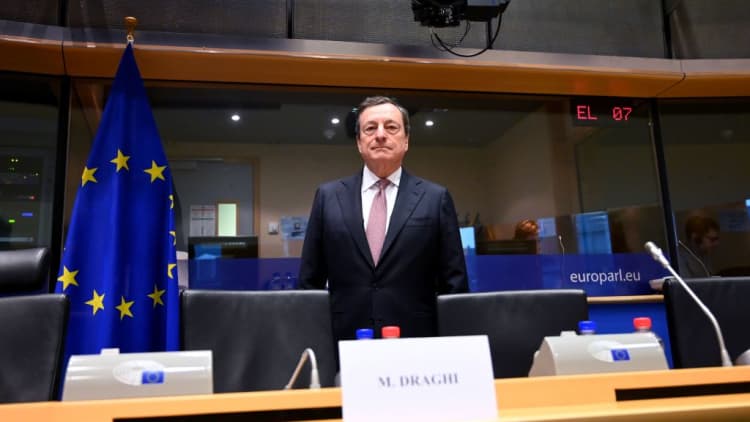
New monetary stimulus from the European Central Bank (ECB) will do "little" to boost the region's sluggish economy and tackle its biggest risks, analysts told CNBC.
"(The ECB's) announcements have some flavor of panic as the ECB's base case scenario still foresees a gradual recovery and the 2020 and 2021 forecasts were hardly revised downwards," Carsten Brzeski, chief economist at ING Germany, said in a note Thursday.
The Frankfurt-based institution surprised markets with a renewed dovish tone. ECB President Mario Draghi said that interest rates would remain at record lows at least until December. Growth forecasts for the euro zone were slashed for this year and new loans to euro zone banks were announced.
"The measures as such are not such a big surprise but the timing of the announcement is," Brzeski added. "(The announcements) are also a bit of a gamble as they will do very little to tackle the biggest risks for the euro zone economy, which according to the ECB stem from external sources."
Draghi even acknowledged this fact in a press conference following the ECB's formal rate decision on Thursday. "We are aware that our decisions (new stimulus) certainly increase the resilience of the euro zone economy, but actually can they address these factors that are weighing on the euro zone economy in the rest of the world? They cannot," Draghi told reporters, adding that protectionism and geopolitics were among those outside risks.
I wonder if the ECB will ever increase rates in this economic cycle.Christoph SchonExecutive director at Axioma
The euro zone economy saw its lowest pace of growth in four years during the final three months of 2018, data showed in January. More recently, manufacturing data have shown a slowdown in activity. This comes amid concerns over global growth, tariffs between the U.S and China, and weakness in emerging markets.
"With few domestic catalysts for a turnaround, it may take a rebound in demand from the emerging world to improve prospects for the (euro zone) region," Tilmann Galler, a global market strategist at J.P. Morgan Asset Management, said in a note Tuesday.
The ECB slashed its growth forecast for 2019 to 1.1 percent from an earlier forecast of 1.7 percent made in December. The bank also lowered its inflation forecasts for 2019. Annual inflation is set to hit 1.2 percent this year, when December forecasts had pointed to a headline inflation target of 1.6 percent. The ECB's inflation target is "close but below 2 percent."
"I wonder if the ECB will ever increase rates in this economic cycle," Christoph Schon, executive director at Axioma, told CNBC Friday, given the prolonged moribund state of the economy.


